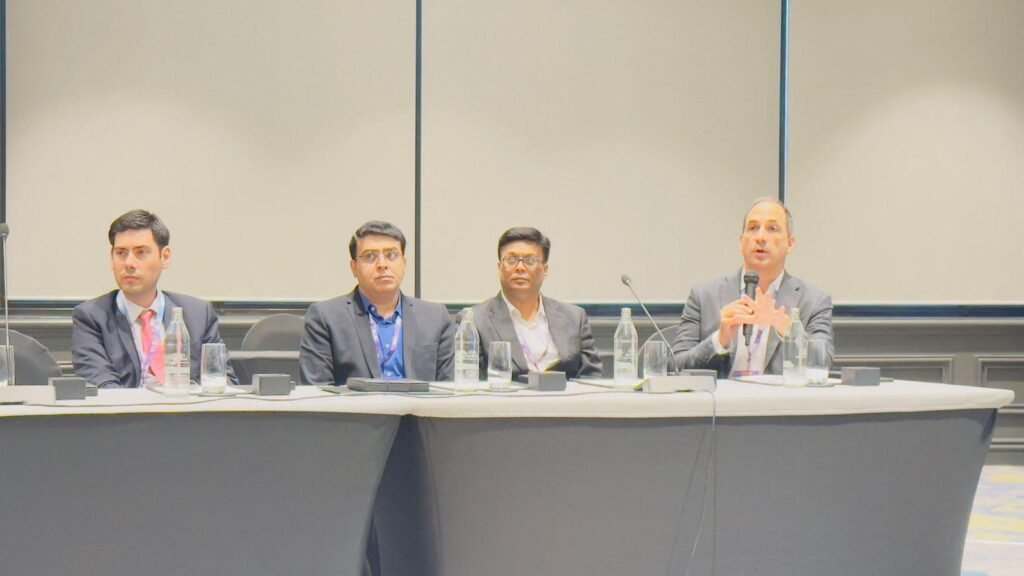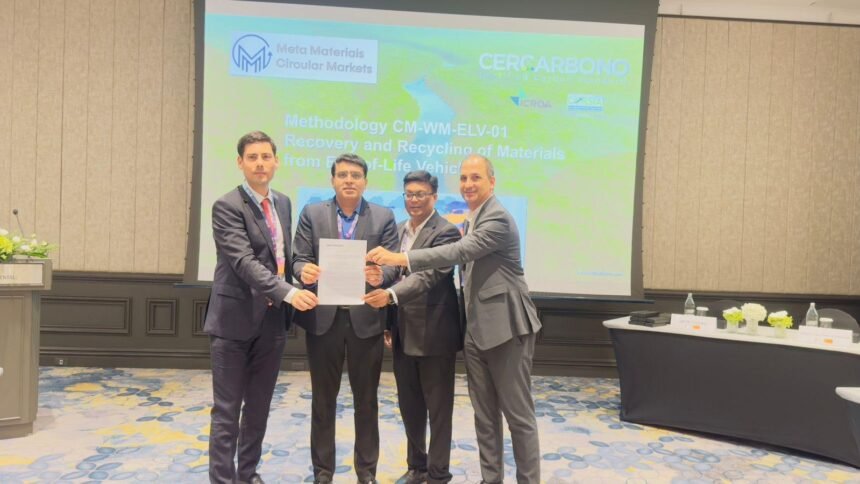Staff Writer
New Delhi: Meta Materials Circular Markets (MMCM), one of India’s leading envirotech enterprises focused on circular economy solutions for the automotive sector, has developed the world’s first recycling methodology for End-of-Life Vehicles (ELVs). The groundbreaking initiative, officially termed Recovery and Recycling of Materials from End-of-Life Vehicles (ELVs), was unveiled in collaboration with global environmental certification body Cercarbono during the Asia Climate Summit in Thailand.
The innovative methodology enables structured dismantling and recycling of ferrous and non-ferrous metals, plastics, and glass from scrapped vehicles, transforming these into substitutes for virgin raw materials. This process reduces greenhouse gas emissions and promotes circular economy practices under a certified climate finance framework. It is also the first ELV methodology globally to facilitate the generation of carbon credits through verified recycling activities.
“This milestone is deeply personal for all of us at MMCM. What started as a bold idea, rooted in Indian innovation, was shaped and strengthened by the many hands and minds who believed in its potential,” said Nitin Chitkara, CEO of MMCM. “As we converge efforts towards building circular and low-carbon economies, this is a pivotal moment for us to present a Made-In-India standardised methodology on a global forum, carrying the spirit of collaboration and shared purpose.”
Chitkara acknowledged Cercarbono’s critical role in refining the methodology, ensuring both its technical robustness and global applicability. “With the launch of the ‘Recovery and Recycling of Materials from End-of-Life Vehicles,’ we’re introducing a formula that is a practical, proven path to circularity,” he added.
Yashodhan Ramteke, Carbon BU Head at MMCM, described the launch as a breakthrough moment for the automotive industry. “These carbon credits are not just high-integrity—they come directly from the OEMs’ own end-of-life vehicle value chain. By enabling measurable emission reductions through recovery, dismantling, and recycling, the methodology empowers auto companies to take real ownership of their Scope 3 emissions. It’s a circular, scalable, and sector-specific climate solution,” he said.

Cercarbono CEO Alex Saer emphasized the broader environmental impact of the initiative. “This methodology delivers a concrete response to the growing challenge of vehicle waste. By enabling carbon finance for regulated recycling systems, we not only reduce emissions but also prevent the environmental harm caused by uncontrolled scrapping practices. It’s a climate solution rooted in circularity and equity,” he stated.
In many rapidly urbanising countries, ELVs are a mounting source of unmanaged industrial waste. Without structured dismantling, these vehicles often end up in informal scrapyards unequipped to handle hazardous substances like oils, coolants, and heavy metals—leading to serious air, soil, and water pollution.
The new methodology offers a structured alternative and applies to Climate Change Mitigation Projects (CCMPs) operating in Registered Vehicle Scrapping Facilities (RVSFs). It covers both new and expansion projects that demonstrate additionality beyond existing recycling practices. Emission reductions are calculated by comparing the carbon footprint of virgin material production with emissions from recycling activities, using conservative correction factors. Only materials that are transformed into chemically and functionally equivalent substitutes qualify for crediting.
The approach also includes stringent requirements for legal compliance, traceability, monitoring, and the exclusion of informal-sector practices. Projects certified under the methodology will be eligible for carbon credit issuance and tracking through EcoRegistry, Cercarbono’s official digital platform.
With ELV volumes expected to surge globally—particularly in emerging economies—the launch underscores the critical need for sustainable recovery infrastructure. MMCM and Cercarbono’s collaborative effort aims to widen access to climate finance and drive systemic change in the automotive recycling ecosystem.







